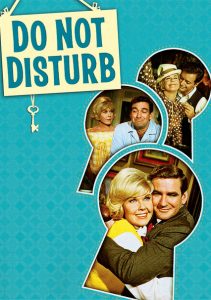Do Not Disturb-1965
Director Ralph Levy, George Marshall
Starring Doris Day, Rod Taylor
Scott’s Review #917
Reviewed July 8, 2019
Grade: C+
Singer and actress Doris Day put her stamp on the romantic comedy genre during the 1960s, becoming synonymous with wholesome film characters. She had spunk and charm and always wore sensible shoes.
Do Not Disturb (1965) is a lightweight, forgettable work with a silly premise, a juvenile script, and a meandering plot.
The film is somewhat saved by the interesting locales of London and Kent, England, but those seeking better quality should seek out the gems The Man Who Knew Too Much (1956) and Pillow Talk (1959).
Day and Rod Taylor star as Janet and Mike Harper, an American couple who relocate to England as part of a transfer for the company he works for. They immediately disagree over where to live; Mike prefers the excitement of London, but Janet favors the rustic quality of Kent.
After she gets them a house thirty miles outside London, the plan backfires when the couple grows further apart due to Mike’s need to commute to London every day. Lonesome and isolated, Janet worries incessantly that Mike is having an affair with his new secretary, Claire Hackett (Maureen McGivney).
Prompted by her busybody landlord, Vanessa Courtwright (Hermione Baddeley), Janet meets an Italian antique dealer, Paul Bellari (Sergio Fantoni), who she hires to redecorate her house. The antics begin with Mike spending more time with Claire, Janet, and Paul in equally close quarters.
Janet and Mike may be innocent, but Paul and Claire could have designs on their potential mates, especially as the foursome faces one compromising situation after another.
The heart of an authentic romantic comedy is good, old-fashioned chemistry between the leads, and Taylor and Day exhibit adequate sparkle but hardly sizzle.
Mediocrity in the setup and writing can be forgiven if other elements, like crackling moments, exist, but those are rare in Do Not Disturb.
Some Like It Hot (1959) embodies a great comedy with romantic wrappings featuring fantastic leads Jack Lemmon and Marilyn Monroe. Still, the former does not come close to finding its footing amid cliche after cliche.
The film is plot-driven and heavy on story-dictated situations rather than character development. The ending is predictable. The jokes fall flat or feel distinctly canned and cheap, and the laughs never catch on.
During a tepid sequence, Janet and Paul visit a remote town to look at antiques. She ends up drinking too much bubbly and becomes drunk and foolhardy.
What should have been comic relief does little to further the plot or flesh out the characters.
Director Ralph Levy makes little effort to steer the film beyond a slick mainstream “affair” despite the release year being 1965 when more edgy works replaced the polished and familiar.
Rather than dare to go to a less-than-cheery place and perhaps decide to have Janet or Mike cheat on their significant others, Levy chooses not to go there, instead attempting to satisfy those seeking a happily-ever-after wrapping.
Not to be entirely negative, Do Not Disturb features remarkable and stunning locale sequences of bustling metropolitan London, quaint English cottages, and wilderness, oozing with culture and sophistication as well as down-home comforts and rich flavor.
The combination of an American couple thrust into a different setting with a new set of rules and regulations to follow makes the film fun and offers a sprinkle of good scenery.
Do Not Disturb (1965) is a mid-1960s mainstream release buried among nests of other similar-themed but better-written films. Even appealing and bankable stars of the time like Taylor and Day could not succeed in spicing up tired gimmicks and plot devices.
The film will forever be relegated to the romantic comedy shelves, teetering on the brink of obscurity.
